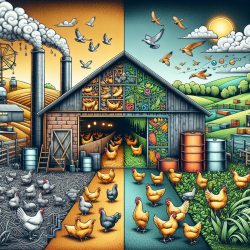Introduction
In the pursuit of sustainable poultry production, researchers are constantly exploring innovative solutions to reduce the environmental impact of chicken broiler farming. One such promising approach is the supplementation of broiler diets with biochar. This blog will delve into the findings of a recent study titled "Effect of Biochar Diet Supplementation on Chicken Broilers Performance, NH3 and Odor Emissions and Meat Consumer Acceptance," which investigates the potential benefits and drawbacks of biochar as a feed additive.
Key Findings
- Ammonia Emissions: The study found that biochar supplementation significantly reduced ammonia emissions from broiler manure by up to 17%. This reduction is crucial for improving air quality and reducing the environmental footprint of poultry farming.
- Feed Conversion Ratio (FCR): While biochar effectively reduced ammonia emissions, it also increased the feed conversion ratio by 8% at higher concentrations. This means that more feed was required for the same weight gain, which could impact production costs.
- Body Weight and Daily Weight Gain: The average body weight and daily weight gain of broilers were negatively affected by biochar supplementation, particularly at higher concentrations. This suggests a trade-off between environmental benefits and production efficiency.
- Meat Consumer Acceptance: Despite the changes in production parameters, the sensory analysis of sous-vide cooked chicken breasts showed no significant differences in consumer acceptance. This indicates that biochar does not adversely affect meat quality.
Implications for Practitioners
For practitioners in the poultry industry, these findings present both opportunities and challenges. On the one hand, biochar supplementation offers a viable strategy for reducing ammonia emissions, which can improve barn air quality and reduce environmental impacts. On the other hand, the increase in feed conversion ratio and decrease in body weight gain highlight the need for careful consideration of biochar concentrations in broiler diets.
Recommendations
Practitioners interested in implementing biochar supplementation should consider the following:
- Optimal Concentration: Start with lower concentrations of biochar to minimize negative impacts on production parameters while still achieving environmental benefits.
- Continuous Monitoring: Regularly monitor broiler performance and adjust biochar concentrations as needed to balance environmental and production goals.
- Further Research: Encourage further research to explore the long-term effects of biochar supplementation and identify optimal formulations that maximize benefits while minimizing drawbacks.
Conclusion
The study on biochar diet supplementation in chicken broilers provides valuable insights into the potential benefits and challenges of this innovative approach. While biochar can significantly reduce ammonia emissions, its impact on production parameters requires careful consideration. By implementing the study's findings and encouraging further research, practitioners can contribute to more sustainable and environmentally friendly poultry production.
To read the original research paper, please follow this link: Effect of Biochar Diet Supplementation on Chicken Broilers Performance, NH3 and Odor Emissions and Meat Consumer Acceptance.










